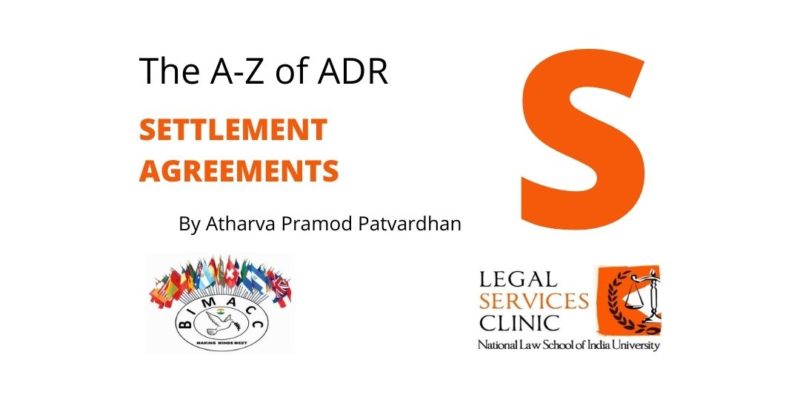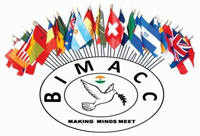
A-Z of ADR: Settlement Agreements
-Atharva Pramod Patvardhan (IInd Year, NLSIU Bangalore)
A settlement is a form of an agreement which is reached at between two feuding parties during the process of mediation or conciliation. These agreements once signed by both the parties are binding. Usually, the parties make an attempt to arrive at a settlement through these processes as it saves court fees and other costs and time required for litigation. Neither party has an obligation to agree on a settlement and can choose to walk away. These settlements are preferable as they give both the parties some control over the terms of the agreement.[1] A document is prepared which contains the terms of settlement which both the parties have agreed upon.
A settlement agreement which is arrived at in a commercial dispute serves to strengthen the business relations. This is because of the possibility of a win-win situation for both parties. This mode of the settlement also serves to save the time of the courts. A settlement agreement also ensures that the dispute between parties is settled amicably. A settlement agreement is drawn up by the mediator based on the statements, the notes of the mediator and the documentary evidence, if any, presented by the parties.
Section 73 of the Arbitration and Conciliation Act, 1996 is the provision pertaining to the creation and signing of a written document. As per the section, the parties can draw up and sign a written settlement agreement. This is done post the agreement of parties and the mediator shall formulate or assist in formulating a possible settlement containing the terms which will then be examined by the parties. There can be changes made at this stage by the mediator according to the recommendations of the parties. The document once signed by the parties will be final and binding. The mediator will also authenticate the settlement agreement and produce a copy to each party.[2]
If this settlement agreement is arrived at in a court-annexed mediation then the settlement should be presented to the court which will then pass a decree on the terms which are in the settlement agreement.[3]
Section 74 of the Arbitration and Conciliation Act, 1996 gives the settlement agreement the same status and effect as that of an arbitral award.[4] Arbitral awards are enforceable as a decree of a court as per Section 36 of the Arbitration and Conciliation Act, 1996.[5] Since a settlement agreement has the same status as an arbitral award, it can be challenged in a court of law on the same grounds as an arbitral award. The vitiating factors are coercion, fraud, corruption, incapacity of a party or the settlement agreement being contrary to a fundamental policy of Indian law or contrary to public policy. Also, to ensure that the confidentiality of the mediation process is maintained, the mediator cannot give evidence in connection to the settlement in question or the mediation in any arbitration or judicial proceedings.[6]
The United Nations Convention on International Settlement Agreements Resulting from Mediation (Singapore Convention) was adopted on 26th June by the United Nations and has 46 countries which have affixed their signatures to this convention which intends to revolutionize the alternate dispute mechanism. The Singapore Convention aims to facilitate the enforcement and recognition of settlement agreement s which fall within the conditions which are prescribed. The Singapore Convention is similar to the New York Convention. This means that a settlement agreement will not be treated as a contract with a civil suit being required to file for its enforcement, the court will directly enforce the agreement which is what the procedure was before the convention.[7] The convention will help in easy enforcement of the settlement agreements while facilitating cross border trade and commerce. A uniform and well-structured framework will be created for international settlement agreements. Mediation will be an additional avenue for dispute resolution in cases of settling commercial cross border-disputes in addition to arbitration and litigation.[8]
[1] ‘Dispute Resolution’ (1979) 88 The Yale Law Journal <https://www.jstor.org/stable/pdf/795821.pdf?ab_segments=0%252Fbasic_SYC-5187%252Ftest> accessed 1 August 2020.
[2] Section 73, The Arbitration and Conciliation Act, 1996.
[3]Sriram Panchu, ‘Mediation In India | Lexology’ (Lexology.com, 2019) <https://www.lexology.com/library/detail.aspx?g=d45eed57-db32-40b6-a5e6-edad2363de76> accessed 1 August 2020.
[4] Section 74, The Arbitration and Conciliation Act, 1996.
[5] Section 36, The Arbitration and Conciliation Act, 1996.
[6] ibid (n 3).
[7] Shaneen Parikh Ifran Shaikh, ‘The Singapore Convention On Mediation – India’S Pro-Enforcement Run Continues | India Corporate Law’ (2019) <https://corporate.cyrilamarchandblogs.com/2019/08/singapore-convention-mediation-india-pro-enforcement-arbitration/?utm_source=Mondaq&utm_medium=syndication&utm_campaign=LinkedIn-integration> accessed 1 August 2020.
[8] ‘About the Convention’ (Singaporeconvention.org) <https://www.singaporeconvention.org/convention/about-convention/> accessed 1 August 2020.
-Atharva Pramod Patvardhan (IInd Year, NLSIU Bangalore)
Atharva Pramod Patvardhan is a second-year student from the National Law School of India University (NLSIU), Bangalore.
BIMACC expresses its gratitude towards the author and to the members of the Legal Services Clinic, National Law School of India University (NLSIU) for their support in our collaborative efforts to promote ADR with this series titled “A-Z of ADR”. The purpose of this series is to increase the understanding of certain fundamental concepts of Alternative Dispute Resolution.
The Legal Services Clinic is a student-run committee that provides free legal services to the socially and the economically backward sections of the society who have difficulty accessing the judicial system. It also has a mandate of spreading legal awareness and providing free legal assistance to those who cannot afford it.
Website: www.legalservicesclinic.org/
Facebook: @legalservicesclinic
Email: lsc.nlsiu@gmail.com
Phone Number: 073586 73214
Disclaimer: The views and opinions expressed in this blog are those of the author and do not necessarily reflect the official policy or position of BIMACC, any of the members of the Board, or the empanelled neutrals. This blog is for informative purpose only and does not constitute legal advice in any manner whatsoever.
